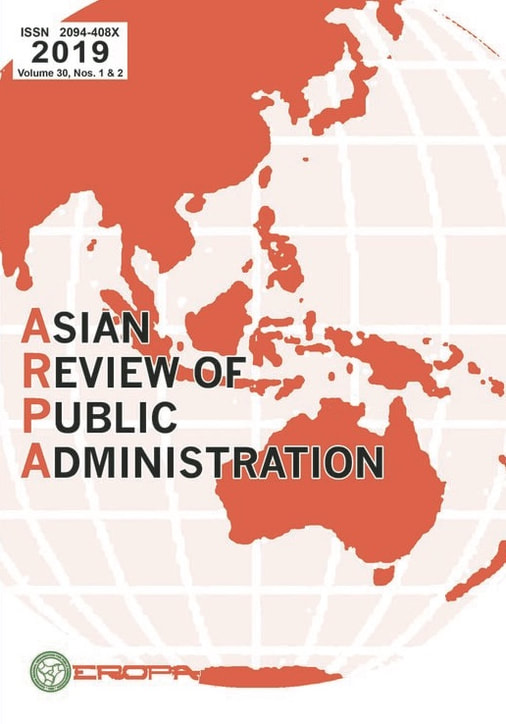|
NAOKI FUJIWARA - Otemon University, Osaka, Japan
The momentum of public water administrative reform intensified in Japan after the experience of the world financial crisis of 2007-2008, as well as the Great East Japan Earthquake and Tsunami event. The public water business reform in Japan continues to exhibit the organizational reform of corporatization and private sector partnership for more efficiency, but it does not show the institutional and resource governance reform examining a new division of roles between the national and local government and citizen participation in the water service policy development process. The “redundancy” of management resources coping with earthquakes and heavy rains is emphasized. Such redundancy of the sewerage service system is a cost-up and uncertain factor in long-term management risk, which is especially highlighted in the process of implementation of public-to private outsourcing contracts.
0 Comments
SIVAKUMAR VELAYUTHAM, Nilai University, Malaysia
RASHEDUL HASAN, INTI International University, Malaysia Public-private partnership (PPP) has been utilized by many countries as a default solution for infrastructure projects. Recently, the application of the PPP concept toward enhancing education quality is witnessed in emerging markets. While the traditional PPP structure is based on a unique relationship between the government and public firms, several various PPP structures have been in practice to deliver goods or services to the general public. In this research, we explore the Trust School initiative undertaken by the Malaysian Ministry of Education (MOE) using a PPP structure by collaborating with Yayasan Amir (a foundation set up by Khazanah, a sovereign wealth fund of the Government of Malaysia). This study adopts a descriptive research framework and uses secondary data in the form of a government report, annual report, and published articles, to critically assess the nature of the PPP relationship between the Ministry of Education (MOE) and Yayasan Amir. A comparative analysis between the traditional PPP structure and the PPP structure adopted for the Trust School initiative reveals that the Trust School initiative appears to be a Corporate Social Responsibility (CSR) project of Khazanah. Findings provided by this study are expected to clarify the accountability relationships among the stakeholders of the Trust School initiative and could allow policymakers to reform strategies relating to resource allocation for the future Trust schools in Malaysia MARWA ALTOWAITEE, ISRAEL NYABURI NYADERA, and MURAT ONDER - Department of Political Science and Public Administration, Ankara Yildirim Beyazit University, Turkey
This paper aims to examine the evolution and changes in the public administration systems of Turkey and Yemen from a historical perspective. It adopts the concept of administrative history to investigate how the two countries, which share similar historical administrative experiences under the Ottoman Empire, ended up with very different structures. The study focuses on the reforms and changes that have occurred in the relations between the central and the local government systems of the two countries. It establishes that, over the years, the two countries adopted different forms of administrative practices that have had a significant impact on their contemporary socio-economic and political situation. It concludes that Turkey has benefited from adopting key administrative reforms while Yemen, currently on the brink of collapse due to the ongoing civil war, can trace some of its woes to inadequate and ineffective reforms in its administrative system. Mobility of Civil Servants in Selected Local Governments in Indonesia: Barriers and Strategies10/12/2020 LINDAWATI, YANA SURYANA, SUWATIN, Center for Administrative Reform Studies, National Institute of Public Administration, Republic of Indonesia
Public services sustainability is dependent on the availability, accessibility, acceptability, and quality of the civil servants. A flexible employment framework is needed to address inequality among regions in Indonesia. This framework contributes to public sector agility by enabling the redeployment of resources after they have been committed and the movement of staff to areas of strategic priority. This study aims to provide an overview of the problems in the distribution of civil servants and to propose some strategies to foster mobility of civil servants in selected local governments in Indonesia. Mixed methods of qualitative nature, desk study, and field research for data collection were used. This study finds that there is uneven distribution of civil servants, inadequate human resources planning, and competence inadequacy. This study also describes some barriers to mobility and strategies proposed to foster mobility of civil servants and divided into two main approaches, namely, centralized and decentralized strategies. |
ARPA 2019, VOL 30, NOS. 1-2 |
- Home
- About
-
Publications
- Public Administration News
-
ARPA
>
- ARPA Scope and Objectives
- ARPA Editorial Board
- ARPA Call for Papers
- Submit Article
-
ARPA Open Access
>
- India (2020-2023, Vol. 31, Nos. 1&2, pg. 4-22)
- Nepal (2020-2023, Vol. 31, Nos. 1&2, pg. 23-46)
- Vietnam (2020-2023, Vol. 31, Nos. 1&2, pg. 47-67)
- China (2020-2023, Vol. 31, Nos. 1&2, pg. 68-79)
- South Korea (2020-2023, Vol. 31, Nos. 1&2, pg. 80-99)
- Bangladesh (2020-2023, Vol. 31, Nos. 1&2, pg. 100-119)
- USA (2020-2023, Vol. 31, Nos. 1&2, pg. 120-141)
- Abstracts >
- Publication Ethics and Malpractice Statement
- Notes for Contributors
- Journal Indexing
- EROPA Bulletin >
- Resources >
- Membership
-
Conferences
-
Activities
- #TAG Dialogue
- Contact Us
- Home
- About
-
Publications
- Public Administration News
-
ARPA
>
- ARPA Scope and Objectives
- ARPA Editorial Board
- ARPA Call for Papers
- Submit Article
-
ARPA Open Access
>
- India (2020-2023, Vol. 31, Nos. 1&2, pg. 4-22)
- Nepal (2020-2023, Vol. 31, Nos. 1&2, pg. 23-46)
- Vietnam (2020-2023, Vol. 31, Nos. 1&2, pg. 47-67)
- China (2020-2023, Vol. 31, Nos. 1&2, pg. 68-79)
- South Korea (2020-2023, Vol. 31, Nos. 1&2, pg. 80-99)
- Bangladesh (2020-2023, Vol. 31, Nos. 1&2, pg. 100-119)
- USA (2020-2023, Vol. 31, Nos. 1&2, pg. 120-141)
- Abstracts >
- Publication Ethics and Malpractice Statement
- Notes for Contributors
- Journal Indexing
- EROPA Bulletin >
- Resources >
- Membership
-
Conferences
-
Activities
- #TAG Dialogue
- Contact Us


 RSS Feed
RSS Feed